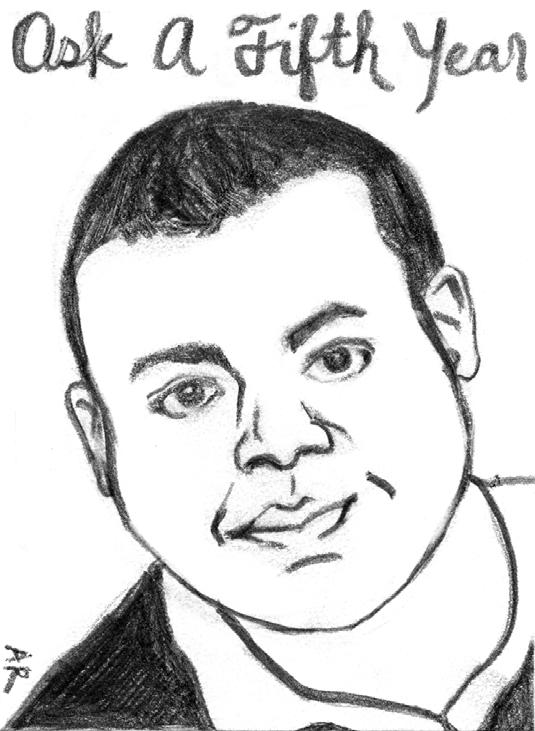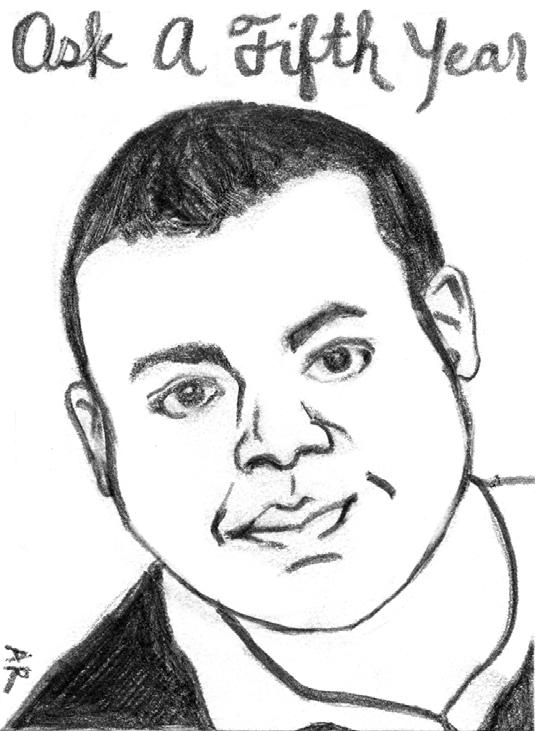
(Drawing by Annie Raccuglia)
Yo Evan!
What are your thoughts on pop culture?
One Love,
—Justin Bieber, Lady Gaga and American Idol
At Lawrence, we have very diverse tastes in music. Yet for all of the diversity, we can often have strong opinions on the tastes of others. I freely admit that I have unfairly judged people for their tastes in music, but today I want to turn that around, and since I write for The Lawrentian, I expect a large portion of you to join me.
I hardly make an effort to inform myself on the happenings in pop culture. I don’t listen to the radio, and my current menu of television shows include “The Rachel Maddow Show,” “The Office” and “Archer,” most of which I watch online. I’m not even “up on” popular Internet memes and videos, often needing my friends to explain their references such as “hide yo’ kids, hide yo’ wife” — which is unfortunate since I am still quoting it, and everyone else has moved on.
Sometimes, I do like to follow search trends on my Bing homepage — which I use because of the awesome pictures, despite the fact that I am a Mac user and the search engine is horrible. The other day I saw a name that I was slightly familiar with: “Justin Bieber.”
I learned from Wikipedia that Bieber is a 16-year-old Canadian-born pop artist. I learned from the rest of the Internets that the young girls go crazy for him through a phenomenon sometimes called “Bieber Fever,” and that people over the age of 13 are not only to dislike his music, but also to hate him as a person.
Apparently, reasons to hate Bieber include the fact that he fancies himself the next Kurt Cobain — just misunderstood — although puberty is doing a number on his boy soprano voice. But honestly, what do you expect? He’s a 16-year-old pop star; of course he has an under-served ego!
I have heard his voice only once. While I was driving my 13-year-old cousin somewhere over winter break, she turned on the radio and started singing along to a chorus containing only the word, “Baby.” I asked her, “Who is this lady?” after which I was schooled — with a great deal of sass — on who Justin Bieber was.
Personally, I didn’t like the music. But the music wasn’t made for me; it was made for 13 year-old girls like my cousin. So I, unlike snooty critics and bloggers, am going on with my life, listening to the music I enjoy. However, laughing at the sophomoric links and articles I found through Bing made me remember my previous vendettas against pop culture.
Last year, I learned that the person singing “Ra ra, shish cumba,” — or something — very loudly in Hiett parties was pop sensation Lady Gaga, who apparently likes to dress in meat.
For a while, I tried to ignore her, yet when a song pounds above you every weekend, it has a way of sticking with you. In later conversations with fellow music majors, I learned that Gaga was formerly a music student in New York, and that if I gave her another chance, I would come to enjoy her music.
I gave her that chance, and came to hate her. My arguments with friends spanned Facebook and the real world alike — so you know they were intense. Eventually, I called her, along with American Idol, a symbol of everything that is wrong with pop culture.
I now regret that statement. While I still do not like her music, I have learned — with the help of Associate Professor of Music Julie McQuinn — to reconsider my hierarchies of music and to not place one form above another, or at least try not to.
I realized that I was being a “hater,” as we used to say in middle school, and knew that I should stop “drinking the Haterade,” especially since I actually do enjoy some pop music. When I’m not pumping Mahler through my speakers, I listen to artists such as Kanye West, the Black Eyed Peas, Fall Out Boy — may they rest in peace — and Maroon 5.
While I know that I have lost the respect of some of you for listing some, if not all, of these artists, I personally do not care. I’m also sure that for every unknown indie or underground band you like, there is someone that thinks your music choices are just as sold-out and commercial as the rest.
There is a reason why these artists sell millions: It is because they are popular. That’s why they call it “pop culture.” So yes, keep your preferences in music, but know that your hate is not making pop culture any weaker; if anything, it only draws more attention to the artists. In other words: Don’t hate the player, hate the game.

